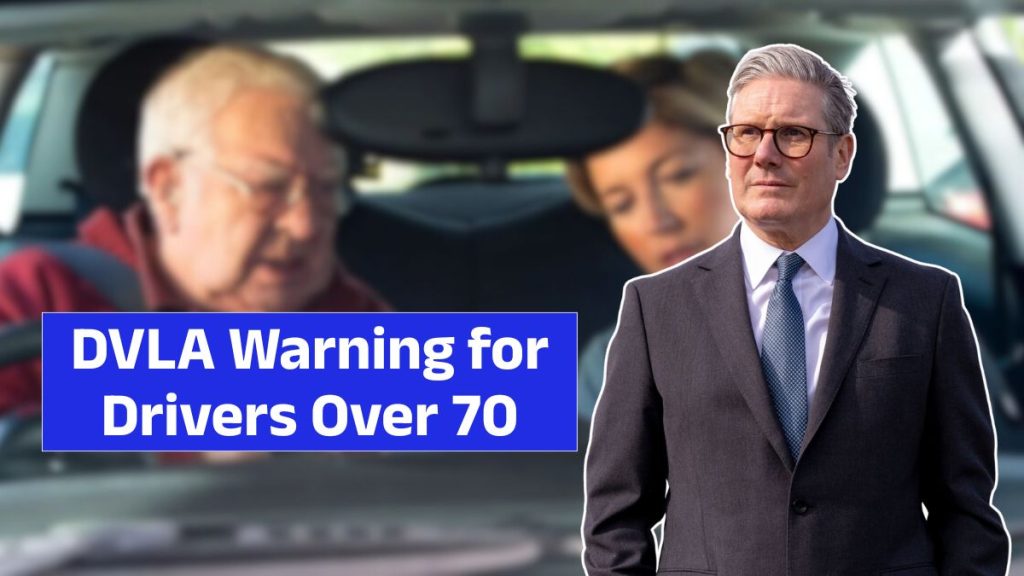Hello Everyone drivers in the UK over the age of 70 are being urged to pay close attention to DVLA rules. Recent reminders highlight that failing to renew a driving licence on time can result in a fine of up to £1,000. While many older motorists are aware of this requirement, thousands still miss renewal deadlines, putting their legal and financial security at risk. This guide explains everything pensioners and their families need to know about renewal after 70, the risks of missing deadlines, and how to stay compliant.
Licence Renewal at 70 – The Key Rule

In the UK, a driving licence automatically expires when a driver reaches the age of 70. Unlike younger motorists, seniors cannot continue driving indefinitely on the same licence. After this milestone, the licence must be renewed every three years.
- Renewal is free of charge.
- The DVLA sends reminders, but responsibility lies with the driver.
- Failing to renew leads to serious legal consequences.
Many older drivers mistakenly assume that their licence remains valid for life. This misunderstanding has led to avoidable fines and prosecutions.
The £1,000 Fine Explained
The DVLA has made it clear: driving without a valid licence is a criminal offence. For those over 70, failing to renew means the licence becomes invalid. If caught, drivers could:
- Face fines of up to £1,000.
- Risk prosecution if stopped by police.
- Discover that their car insurance is void.
Most cases are flagged during routine police checks or after accidents. The fine is intended not only as punishment but as a reminder of the importance of compliance.
How to Renew Your Licence at 70
Renewal is a straightforward process, but it requires timely action. There are two main ways to apply:
1. Renew Online
- Visit the official DVLA website.
- Log in or create an account.
- Update personal details and health information.
- Submit your application and receive the new licence by post.
2. Renew by Post
- Use the D46P form, sent around 90 days before expiry.
- Complete the form and return it by mail.
Renewal is free, but drivers must declare any medical conditions that could impact their ability to drive. Providing false information could result in severe penalties.
Medical Conditions and Fitness to Drive
At 70, health plays a significant role in driving safety. The DVLA requires drivers to declare conditions such as:
- Vision problems
- Epilepsy
- Heart issues
- Diabetes
- Neurological conditions
If these conditions could affect road safety, the DVLA may request medical checks before approval. While some drivers fear losing their licence, most can continue driving with the correct treatment and evidence from medical professionals.
Insurance Implications of Missing Renewal
Driving without a valid licence also has consequences for insurance.
- Insurers void policies if the driver’s licence is expired.
- Accident claims are rejected, leaving the driver liable.
- Costs for damages and medical expenses may fall entirely on the driver.
For over-70s, failing to renew a licence could result in financial loss far greater than the £1,000 fine.
Common Mistakes by Over-70 Drivers
Many older motorists run into problems due to simple errors. Common mistakes include:
- Assuming the licence is valid if the plastic card looks fine.
- Believing renewal happens automatically.
- Failing to update DVLA with medical changes.
Awareness is the first step in avoiding these costly mistakes.
Support for Older Drivers
Not all seniors find the renewal process easy. Some may struggle with forms, online systems, or health declarations. Fortunately, support is available:
- Family members can assist with applications.
- Charities like Age UK offer guidance.
- The DVLA provides accessible services for people with visual or hearing impairments.
With proper support, renewal can be completed smoothly, ensuring independence and compliance.
DVLA’s Role and Future Changes
The DVLA’s mission is not only to process renewals but to maintain road safety across the UK. With the number of older drivers increasing, new tools are being developed:
- Digital reminders to help pensioners remember renewal deadlines.
- Simplified online systems for easier use.
- Potential future health and vision checks during renewal.
These measures are designed to balance independence for seniors with safety for all road users.
Why These Rules Exist
Research shows that drivers over 70 are at higher risk of certain types of collisions, particularly at junctions. By requiring renewal every three years, the DVLA ensures that seniors who are safe to drive can continue to do so, while those with serious health concerns are identified and supported.
This approach strikes a balance between safety and independence.
FAQs
Q1: Do I have to pay to renew my driving licence at 70?
No. Licence renewal after 70 is completely free of charge, but it must be completed every three years.
Q2: What happens if I forget to renew my licence?
Driving with an expired licence is illegal and can result in a £1,000 fine and invalid insurance.
Q3: Can I still drive while my renewal is being processed?
Yes, if you applied before your licence expired, you are usually allowed to continue driving while waiting for the new licence.
Q4: Do I need to declare health conditions when renewing?
Yes. Conditions like vision problems, diabetes, or epilepsy must be declared. Failure to do so could result in fines or restrictions.
Q5: How do I know when my licence expires?
Check the expiry date printed on your licence card. The DVLA also sends reminders about 90 days before expiry.














